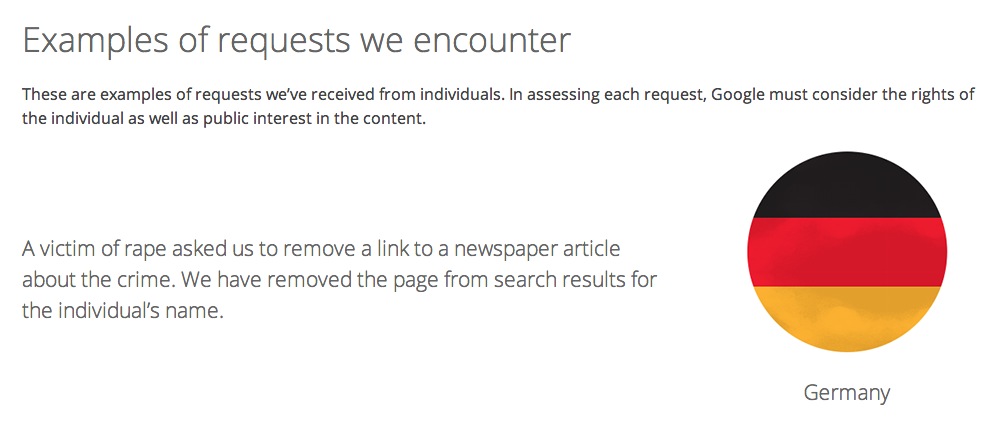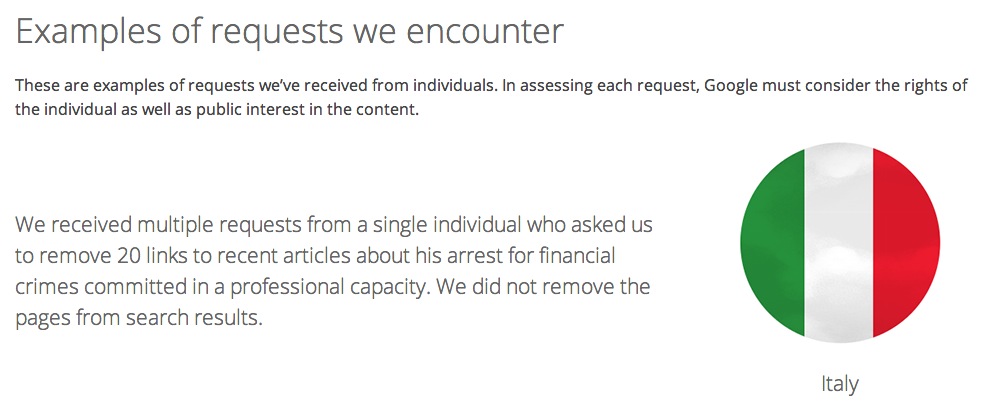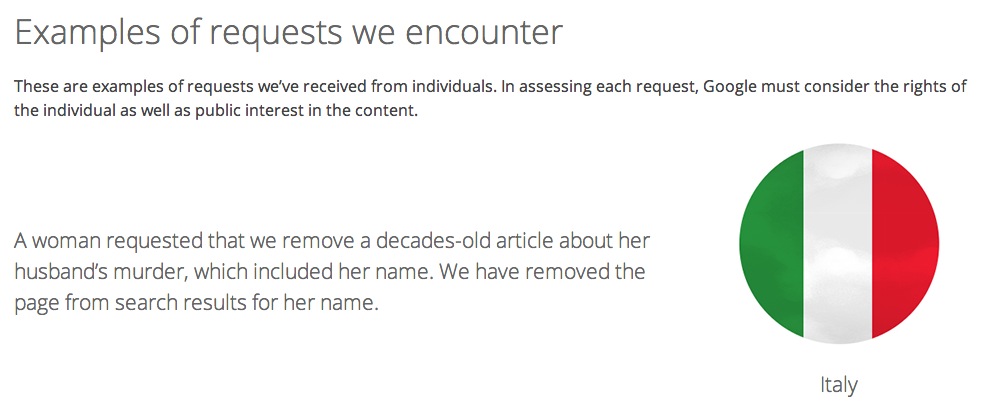The Right to Be Forgotten
Want help removing unwanted Google results?
Call BrandYourself at (646) 863-8282 or email us at concierge@brandyourself.com.
What is the “Right to Be Forgotten”?
All it takes is one person mentioning your name online to create a permanently archived opinion of you, just one Google search away. So it’s no surprise that many perfectly good people have negative, outdated or irrelevant search results.
Until now, there was no easy way to remove unwanted results like those from Google. Your only option was to provide Google with a court order that judged a search result to be defamatory or libelous. But attempting to get a court order costs time and money. It’s also incredibly difficult to actually prove defamation or libel, even with deeply experienced legal counsel.
But thanks to a landmark resolution passed by the European Union’s highest court, all that changed recently. It ruled that Europeans and Argentinians have the “Right to be forgotten” in search engines. Europeans can now ask Google to remove a webpage from search results if the page is “inadequate, irrelevant or no longer relevant, or excessive in relation to the purposes for which they were processed and in the light of the time that has elapsed.”
Since this ruling, Google has already received 162,338 requests to remove search results. And it’s honored 41% of them. The good news is that if you can manage to craft a very compelling case for yourself and you’re in Europe or Argentina, you have a shot at removing unwanted results this way. If you think this might apply to you, contact us immediately. We seen firsthand what works and what doesn’t, and understand how to push a request through as quickly as possible with the highest chances of success. If you want help taking advantage of this new law, get in touch. Otherwise, read on to learn more about how it came to be – and how takedown requests have played out so far.
The Right To Be Informed
The year is 1850. You wake up in bed after a rather wild night with your friends. You vaguely remember taking off your shoes and and dancing on top of the table at the bar. Was there a flute involved? Details are hazy. When you meet everyone in the center of town you get ribbed for your performance – you did strut your stuff in front of everyone. What happens next? Does that moment become archived in the encyclopedia of the times? A picture of you doing your best satyr impression next to your name and the words “Drunken Fool” for the world to see? Of course not. Your friends and even your enemies will have forgotten all about it in a matter of weeks. Those of us living in this century, however, are not so lucky.
The internet is filled with tons of (generally) positive and useful content. In order to access it, you need a tool. Nearly 70% of the time (90% on mobile devices), that tool is Google. Like all tools, Google can harm as well as hurt you. That picture taken on one night out of your whole life of nights and a whole library of possible pictures becomes the calling card Google brings to the fore whenever your name is typed into its search box.
A lot of people have been hurt by this, have lost jobs and other opportunities, have faced ridicule and shame because of bad results. It didn’t (and doesn’t) seem fair, so, some people figured there should be a way out. One of these people was Mario Costeja González.
Mario Costeja González: The First to Be Forgotten
The first thing you need to know about Mario Costeja González is he is a good person. He is in the right in his case (it seems this will come to have an effect on the RTBF). The next thing you need to know is he is a lawyer who lives in Spain — for the record, it definitely helps to be a lawyer yourself when you start a legal battle with one of the largest companies in the world.
González heard from a friend that there was a result on Google that stated his house had been repossessed because he didn’t pay his taxes. The trouble was González had paid his taxes and had sold the house years earlier. His argument, which was supported by the Agency for Data Protection in Spain, was the information shown by that result was false and so Google should remove it.
Six years after he filed his claim against Google, the case was found in his favor by the Court of Justice of the European Union (EJC). Google was required to remove the webpage from it’s search results. The mandate didn’t stop there, though. The EJC also provided an outline for Google’s interaction with other individuals who request that information be removed.
The EJC specifically mandated that Google must take down “inadequate, irrelevant or no longer relevant, or excessive in relation to the purposes for which they were processed and in the light of the time that has elapsed.” The ruling in its entirety can be found here. This language is, as legal jargon often is, as clear as a glass of mud. What does it mean to be relevant? Relevant to whom? How much time must elapse for a result regarding a repossessed house to be considered irrelevant? How about a result regarding a traffic violation? Manslaughter? Murder?
And what about people using Google outside of the EU’s jurisdiction?
EU vs. United States Law
It is prudent here to insert a brief description of the differences between US law and EU law when it comes to privacy and control of one’s reputation. The legal powers of the United States, which are not extending the benefits of the Right To Be Forgotten to American citizens, believe that information should flow freely in order to best educate and protect its citizens and democracy from the dangers of censorship and tyranny. They rely on tort law to protect individuals from the harmful effects of blatant and malicious falsehoods, specifically laws protecting one from libel. Should someone post something online that is false, presumably the U.S. legal system would offer recompense for the libeled individual. However, if something is true the U.S. government refuses to protect its citizenry from any negative effects that may arise. That would be an infringement on the right of free speech and the right of the public to have access to true information.
In Europe, things operate similarly but with more range. The European high court sees privacy as a right. They consider the individual as the arbiter of what should and should not be released about private matters (including, but not limited to, those that take place in the home, secrets, thoughts, and ideas – see article 8 for the exact verbiage). There is a right to privacy in the U.S. as well, but it does not hold the weight that it does in the EU as it falls on states to provide for the protection of the privacy of its people rather than the federal government.
The differences becomes all the more clear when you add in the Right To Be Forgotten. In the EU, and soon Argentina, if you make a mistake or find something online that displeases you, you have the right to dispute that with Google and, in turn, Google will review your case and remove the data should it find the information to be irrelevant or unimportant to the general public. In the US, you can request that Google remove false information but, if it is true, Google has no obligation (or desire) to do so..
Look Both Ways
Imagine the Internet as a cross walk. The oncoming traffic represents all the other people on the web and, therefore, the trouble you could get yourself into if you are not careful when you cross. Upload a picture of yourself in your skivvies? Woah! That’s like getting nicked by a speeding car! Post a picture of your cat? I bet you get some great honks and waves from passersby — let’s be honest — probably some would stop and give you a high five.
The US laws act like a traffic light, they tell you when it is safe to move across and when it would be unwise. But, they don’t interfere with the traffic that is going through the intersection and will not intercede if you try and cross at a bad time.
The EU laws, specifically the RTBF looks to act more like a crossing guard that can step out and stop traffic on your behalf as you cross the street or even reach out and grab you to save you from an oncoming car as you go on your merry way.
So, it sounds like the RTBF is pretty awesome, doesn’t it? Too bad for those guys in the US who have to watch out for themselves. In the EU, you can do whatever you want and then just tell Google to make you look perfect when it comes time to apply for that new job, right?
Wrong.
Do You Qualify?
Google is given authority by the Right To Be Forgotten to eliminate records but also to decline requests that it deems do not fit the terms of the law. Since the ruling at the end of August, Google has received 162,338 requests for removal. Of these only 41% have been removed. So, would your results be taken away if you asked? How does Google decide whether something stays or doesn’t? Those are the right questions to ask.
Google has posted a few of the requests it received and the verdict it passed on them. To understand their process we must return to the word of the law and look at these case examples carefully.
Google cannot remove links to information that the public has an interest in or might have an interest in. That information is deemed “relevant” and so would not satisfy the requirement of the law that the information being removed must be “irrelevant.” On the website that displays their results they write, “search engines must assess each individual’s request for removal” and state that “a search engine can only continue to display certain results where there is a public interest in doing so.”
Alright, now we’ve looked at the law, let’s have a look at the examples. The following examples were all pulled directly from Google’s transparency report page. First, two that resulted in Google removing the pages:
 In both of these cases, it seems that Google has ruled in favor of the person in the “right” or the “good” person (remember I told you that being good would be important!). In the first case, the woman had nothing to do with the murder and was practically a helpless victim of her results; those results were removed. In the second case, the individual truly was a victim and therefore did not deserve to face the harm that could come from having his/her name associated with the results.
In both of these cases, it seems that Google has ruled in favor of the person in the “right” or the “good” person (remember I told you that being good would be important!). In the first case, the woman had nothing to do with the murder and was practically a helpless victim of her results; those results were removed. In the second case, the individual truly was a victim and therefore did not deserve to face the harm that could come from having his/her name associated with the results.
Let’s look at an example of a request Google rejected:
 The individual here was believed to be responsible for the negative results on his/her page and therefore, must suffer the consequences. This individual’s online reputation will remain tarnished until other results overtake the negative ones. How did Google decide this individual was not innocent of their crimes? Doesn’t this person deserve to have a chance at a normal life even if they made a mistake? What can this individual do now?
The individual here was believed to be responsible for the negative results on his/her page and therefore, must suffer the consequences. This individual’s online reputation will remain tarnished until other results overtake the negative ones. How did Google decide this individual was not innocent of their crimes? Doesn’t this person deserve to have a chance at a normal life even if they made a mistake? What can this individual do now?
There are services out there that will help people who Google refuses. BrandYourself is the leader in the industry today. If you aren’t sure they can help, have a go with their free service and see for yourself just how much of an impact they can have. For those with a more complicated situation, BrandYourself has a team of experienced Online Reputation Managers ready to assist. You can reach those helpful people here.
Clearly, the Right to Be Forgotten is not a cleanup service for anyone out there who has done regrettable or unflattering things in the past and wants to get a fresh start. Google is holding those who are responsible for their results accountable and helping those who it decides deserve it to free themselves from the burden of a negative online reputation.
TLDR
As a finale, let’s review and clear up a few things. There are a few key things to remember:
The Right To Be Forgotten applies to EU citizens and those in Argentina will most likely be protected soon. Those in the US or any other country need not apply.
Google is only removing the results from sub domains dedicated to the country from whence the request originated. Google.com, as it is technically dedicated to the US will remain unaffected no matter what. This means if you get your results removed in Germany, people searching on google.com, google.ca, google.co.uk, etc. will see the results without changes.
The Right To Be Forgotten only extends so far and Google itself decides just how far it will go. If Google determines that the information you request to be removed would be irresponsible to remove as it would impact the quality of information available to the public, those results will not be removed.
So, what can an individual do if they want to see things changed? Contact us immediately to get help crafting your request to Google. We have experience working with Google and can make sure you are giving yourself the best possible chance to have your results removed.
Additional Resources
- Check out our online reputation management guide.
- Try our online reputation management tools.
- Read our BrandYourself reviews to see how we’ve helped other people improve their Google results.
Want help removing unwanted Google results?
Call BrandYourself at 315-565-1799 or email us at concierge@brandyourself.com.


